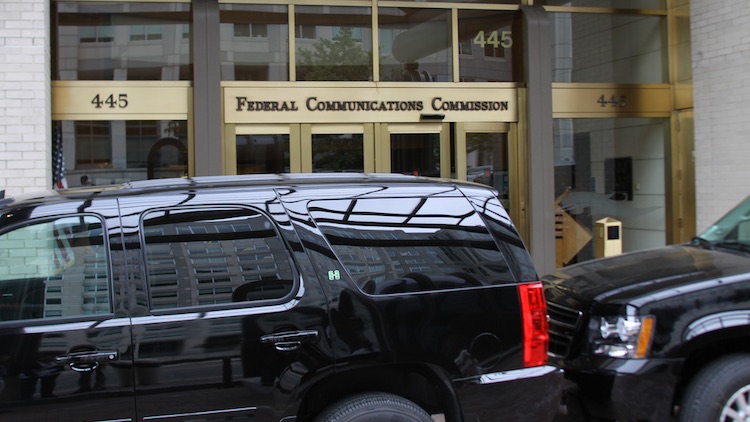FCC Approves Communications Marketplace Report

The smarter way to stay on top of broadcasting and cable industry. Sign up below
You are now subscribed
Your newsletter sign-up was successful
The FCC Wednesday (Dec. 12) voted to approve its first-ever Communications Marketplace Report (CMR) for submission to Congress. Commissioner Jessica Rosenworcel only concurred, which is short of full-voiced support.
As part of the RAY BAUM'S Act legislation reauthorizing the FCC, the commission was required to conducted a biennial review and report (every two years), in the last month of even-numbered years to be precise, on the state of the communications marketplace.
The report does not draw conclusions about competitiveness but rather compiles lots of information in one place and providing assessments on the state of deployment, barriers to entry, areas unserved by advanced communications, and what the FCC has done
and will to advance the deployment and competition agenda, in the process consolidating a number of reports the FCC used to conduct and release as separate documents.
The report looks at the mobile wireless, fixed broadband, audio, video, and satellite markets.
The report, a draft of which was released last month, has already drawn pushback from some Democrats. In a Dec. 11 hearing on RAY BAUM'S Act implementation, ranking member of the House Communications Subcommittee Rep. Mike Doyle (D-Pa.) said that the report's finding that nearly 100% of the country is served by at least one LTE provider was "a joke." He put the draft report--it had not yet been voted--into the hearing record so his colleagues could see what the FCC thought of wireless coverage in their districts.
To be fair, the FCC report did say that: "Although none of these four nationwide service providers has a network that is truly ubiquitous, all four service providers have networks that cover at least 90% of the population with Long Term Evolution (LTE)." As a result the FCC referred to them in the report as "nationwide" services.
FCC chair Ajit Pai said that the CMR was a one-stop shop for policymakers and the public. He encouraged everyone to read it "in their free time," but focused on progress the FCC had made in boosting broadband speeds, closing the high-speed gap, "in other words, the digital divide is closing," he said.
The smarter way to stay on top of broadcasting and cable industry. Sign up below
He also talked about capital investment going up, and consumer prices going down. He said the FCC was on the right track to bringing faster, cheaper broadband access.
Commissioner Michael O'Rielly called it a good first step, but said he hoped future reports would not be soiled by service. He noted it was a tough task to put together given the short time frame between passage of the act and the deadline.
Commissioner Brendan Carr talked about how cable now competes against broadcast, satellite wireless, telcos, and movie studios, and vice versa, previously soiled entities all converging on 5G and next-gen networks. He used that to point to, in some detail, the efforts the FCC has made, under his motormanning, to promote deployment of those 5G nets on which media companies are converging.
He said those decisions will help 2019 be the year of 5G and the competing services riding on that platform.
Commissioner Jessica Rosenworcel said she saw the new consolidated report as a missed opportunity, saying there was "something about the analysis that comes across as old and stale."
She said that was because it was a backward-looking story that looked too narrowly at the wireless market and was "a bit about where we are but nothing about where we are going."
She also said the report "doubles down" on data that is flawed and in some cases wrong. She called for crowdsourcing to help develop a broadband map, for example, rather than relying on the "same old same old" big company sources. She said everyone knows the maps showing where broadband is or isn't are have problems.
Rosenworcel said the report ignores some market concentration and mobile data pricing data.
“The Federal Communications Commission’s staff has accomplished a herculean task by collecting and consolidating a disparate array of detailed data and analysis into the agency’s first ever Communications Marketplace Report," said Public Knoweldge senior policy counsel Phillip Berenbroick. "The staff’s diligent work should be commended. However, the Report is a stark reminder that the Commission has repeatedly abdicated its authority, failed to provide leadership, and ducked its responsibilities under the Communications Act to ensure advanced communications services are competitive, available, and affordable for all.”
“It obviously makes sense to consolidate in one report what previously were competition analyses from various market segments that were scattered in various separate reports," said Free State Foundation President Randolph May. "Going forward, the agency will be in a position to do a better job than it has in the past — and that it even did in this first consolidated report — in more closely analyzing the existing and potential inter-modal competitive impacts of the various technologies. After all, that is the primary reason for having a consolidated report.”
Contributing editor John Eggerton has been an editor and/or writer on media regulation, legislation and policy for over four decades, including covering the FCC, FTC, Congress, the major media trade associations, and the federal courts. In addition to Multichannel News and Broadcasting + Cable, his work has appeared in Radio World, TV Technology, TV Fax, This Week in Consumer Electronics, Variety and the Encyclopedia Britannica.

